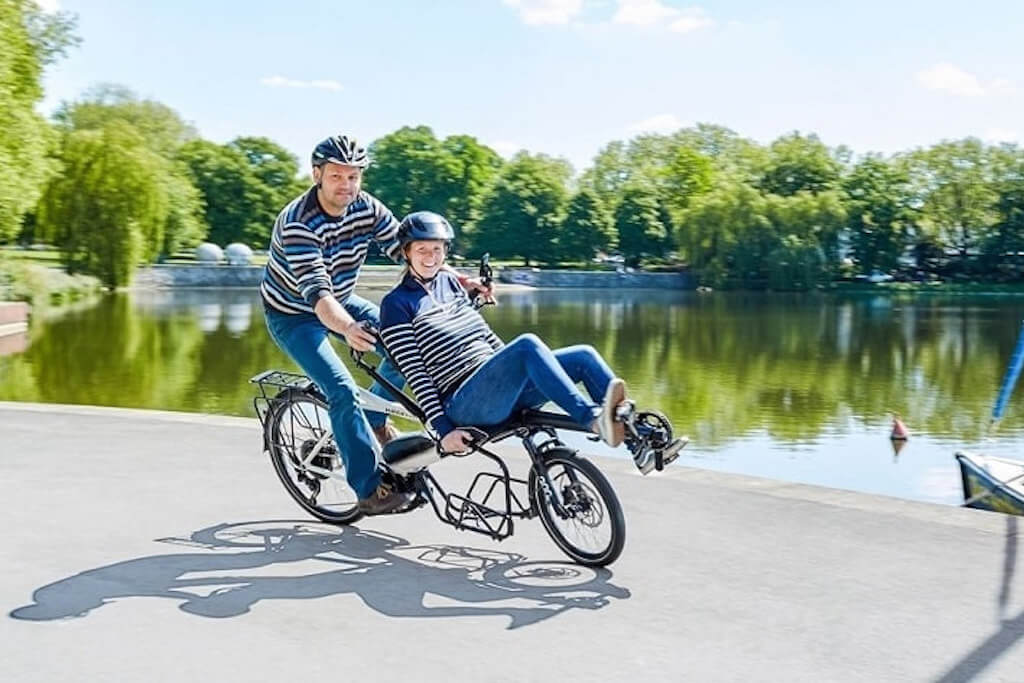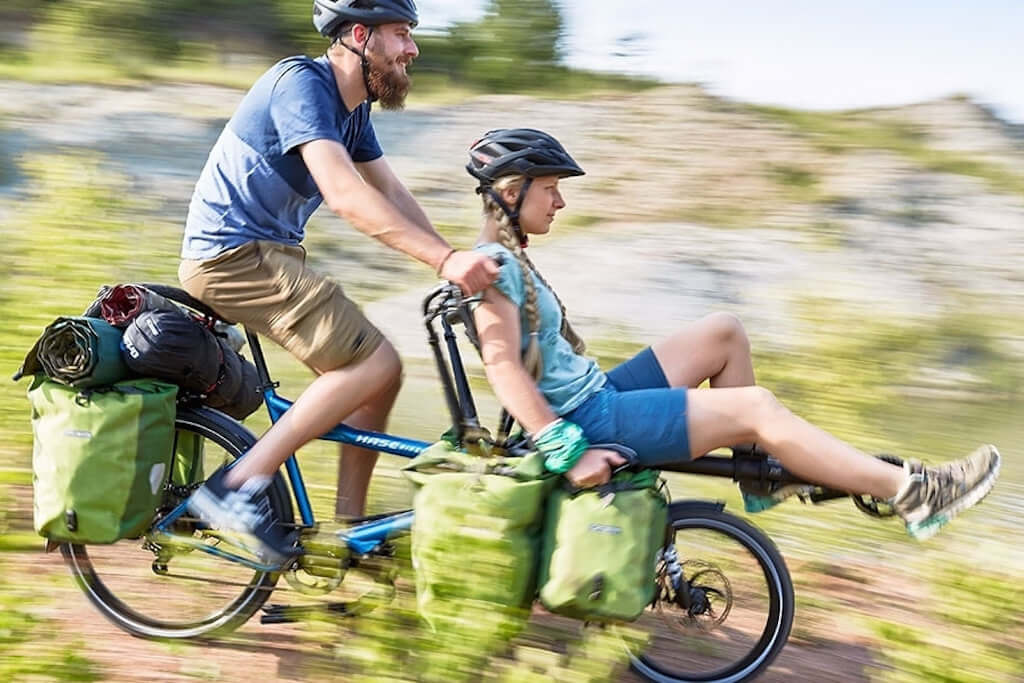Autumn Gear Guide
Find inspiration in our Gear Guide that will keep you out on your bike through wind or rain.
Download NowAdaptive cycling allows people facing a range of challenges to enjoy increased mobility for fun and for fitness. Let’s call her Jane Doe. She was young and athletic, and she was respected for a certain sport. One day, she tripped. The fall was unexpected, but it was the first of many. Doctors couldn’t explain why […]
Adaptive cycling allows people facing a range of challenges to enjoy increased mobility for fun and for fitness.

Let’s call her Jane Doe. She was young and athletic, and she was respected for a certain sport. One day, she tripped. The fall was unexpected, but it was the first of many. Doctors couldn’t explain why she was losing control of her body, but it looked like Jane was in the early stages of ALS.
Jane wanted to stay active. She couldn’t imagine herself abandoning sports altogether. So she came to RAD Innovations, to find her way into adaptive cycling.
“The reality is, in the adaptive-inclusive world, there are maybe a dozen active bike vendors in the United States that are able to fit an individual [with a physical disability],” says David Black, co-owner of RAD Innovations. “Of the hundreds and thousands of bike shops, there aren’t many like this one.”
RAD is based in the tiny town of Cornwall, Vermont, and Black co-founded the company with his wife Anja Wrede. Put simply, RAD distributes high-quality adaptive cycles to a wide range of customers. Someone like Jane Doe could select from a dynamic catalog of self-powered machines: recumbent trikes, hand-cycles, and sophisticated tandems. One of their many specialties is the “running frame,” which is like a cross between a walker and a racing bike. Running frames enable people with severe mobility issues, such as cerebral palsy, to experience wheeled movement.
But RAD Innovations isn’t your typical bike shop. The company is based on their family farm, where Wrede and Black have lived and raised livestock since 2015. Nestled into pastoral fields, the property boasts a handsome Vermont farmhouse, a barn, a garden — and a cottage, which doubles as an Airbnb. Visitors travel from across the country to stay on the farm, where they can be properly fitted for an adaptive cycle. Wrede is a longtime mechanic, and once she has refined a new cycle, the guest can learn how to operate it on quiet country roads.
“That’s one of the things that’s changed in the last few years,” says Black. “Beyond the idea of building and distributing a product, we are becoming more involved in the programs and the training of people wanting to utilize these kinds of things. That wasn’t really on my radar five or 10 years ago. And I love doing it. I like meeting with people and saying, ‘Let’s try this, let’s try that.’”
“With some, we have dinner,” says Anja. “Some come back as vacationers, and they rent a bike here and go on tours.”
Black and Wrede had each embarked on long and winding journeys before they found each other. Black primarily grew up in Northern Virginia, but when his father became an early Peace Corps volunteer, Black spent two adolescent years in Kenya. He developed a passion for horses, which continues to this day. After a long and storied IT career, Black spent much of the 1990s developing adult pushchairs and running strollers. Trained as an engineer, Black was mostly drawn to the industrial design element; he didn’t consider himself a serious cyclist.
In contrast, Wrede grew up in the city of Potsdam, which was then located in East Germany. Wrede was 20 years old when the Berlin Wall came down, and she had trained as a mason. When a formerly West German bike shop needed some tile work done, the owners offered to build Wrede a bicycle in lieu of cash payment. Soon, she was working for the shop herself, commuting back and forth by bike.

“I worked there for about a year,” she recalls. In 1991, she joined another bike shop, this time as a business partner. “We had this bike shop for a while, and that was when I was an avid bike rider. We would go with friends to Mallorca and ride a thousand kilometers in a week.”
The pair finally crossed paths when Black made a business trip to Germany in 1999. Wrede was working as product manager for a bicycle company in Cologne; Black knew the owner of the company and “showed up at the office without an appointment,” Wrede recalls with a chuckle. From there, a courtship began.
Eventually, Wrede and Black moved to the U.S. to raise their son. Black had lived in Vermont during the 1970s and 80s, and the couple took a trip to visit old friends. Wrede loved the atmosphere of the Green Mountain State, and they decided to settle down in the bucolic Champlain Valley.
RAD Innovations was incorporated in 2004, but the company has evolved considerably since that time, as has the global adaptive cycling industry. About 20 percent of RAD’s customers are simply aging; they have heard of recumbent trikes, which are comfortable and ergonomic and can provide many more years of riding.
“There are Baby Boomers who want to stay active, but they can’t risk the fall,” says Black. “I’ve got cases where they can do certain things now that they won’t be able to do too far out from now. And the opportunity has to be now.”
But the vast majority of adaptive cycling clients are people with serious mobility issues: spinal cord injuries, multiple sclerosis, CP, Parkinson’s, balance issues, and past amputations. They estimate having sold about 15,000 individual units since RAD was first founded. Given how expensive many of these models can be, routinely costing thousands of dollars each, that number speaks to the demand for adaptive cycles.
Most customers order remotely or only visit the farm for a few hours. But several dozen have stayed in the guesthouse, where they can ease into a new machine that has been tailored to their needs. Much of the work is done beforehand over the phone, but the fitting is best done in person.
“Somebody will come down the driveway,” says Black. “They’ll park. The dogs will greet them. We’ve already done a preliminary discussion about what they want, what they’re looking for. They’re here to try it and be fitted in a more formalized way. I can see as they’re getting out of the car the direction that this likely is going to go. It may be very different from the conversation that we had a week or two before.
“There’s this dynamic,” he adds, “of getting people to not be fearful or to try things they never tried before, or do something that they never thought they could do.”
Robert Isenberg is a writer and multimedia producer based in Providence, Rhode Island. You can find some of his essays about cycling on Medium.
Find inspiration in our Gear Guide that will keep you out on your bike through wind or rain.
Download Now
Leave a comment